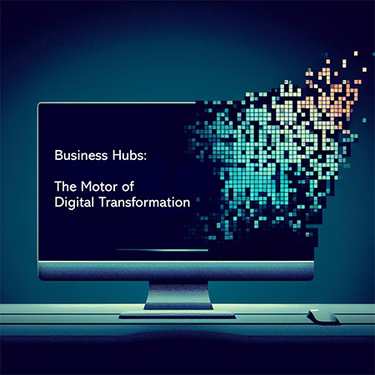
The digital revolution has fundamentally reshaped the way businesses operate. Traditional brick-and-mortar models are no longer the sole domain of success. Companies are embracing online platforms, remote workforces, and a globalized marketplace. This shift has necessitated a new breed of business support system: the digital business hub.
The term "business hub" isn't confined to a single image. It encompasses a spectrum of physical and virtual spaces designed to empower businesses in the digital age. Here's a breakdown of some key variations:
Co-working spaces: These vibrant hubs offer flexible work environments for startups, freelancers, and remote teams. They provide shared office space, meeting rooms, and amenities like high-speed internet, fostering a collaborative atmosphere and reducing overhead costs for smaller businesses.
Industry-specific centers: These specialized hubs cater to specific industries, such as technology, healthcare, or finance. They offer tailored resources, networking opportunities with industry veterans, and access to potential investors or partners.
Virtual hubs: The digital realm offers its own take on business hubs. Online platforms connect entrepreneurs and businesses, providing access to resources, educational webinars, and virtual networking events. This eliminates geographical limitations and allows participation from a wider range of professionals.
Business hubs, both physical and virtual, act as powerhouses for digital transformation by offering a range of crucial resources:
Technology Infrastructure: Staying ahead in the digital game requires access to the latest technology. Hubs often provide high-speed internet, cloud computing platforms, and even specialized equipment like 3D printers or virtual reality tools. This empowers businesses to experiment with new technologies and optimize their digital operations.
Digital marketing expertise: The digital landscape demands proficiency in online marketing strategies. Business hubs often have on-site experts or offer workshops and seminars on topics like social media marketing, search engine optimization (SEO), and e-commerce best practices.
E-commerce support: The rise of e-commerce has created a demand for specialized services. Some hubs cater specifically to online businesses, providing resources like product photography studios, fulfillment centers, and access to shipping logistics networks. This streamlines the e-commerce process and allows businesses to compete effectively in the online marketplace.
The true power of business hubs lies not just in the resources they offer, but in the sense of community they cultivate. Here's how hubs drive innovation and collaboration in the digital age:
Networking opportunities: Business hubs bring together entrepreneurs, investors, and professionals from diverse industries. This fosters collaboration, sparks new ideas, and opens doors to potential partnerships.
Mentorship programs: Many hubs offer mentorship programs where seasoned professionals guide and advise startups or smaller businesses. This invaluable support system helps navigate challenges, refine strategies, and accelerate growth.
Knowledge sharing: Workshops, seminars, and conferences hosted by business hubs provide a platform for knowledge sharing. This allows businesses to stay updated on the latest digital trends, learn from each other's experiences, and adopt best practices.
The landscape of business hubs is constantly evolving. As the digital world continues to develop, we can expect to see a rise in:
Specialized hubs: Catering to niche markets with highly specific needs, offering resources and expertise tailored to these industries.
Globally connected network: A network of interconnected business hubs across the world, fostering collaboration and knowledge exchange across geographical boundaries.
Virtual reality integration: The use of virtual reality in business hubs to create immersive experiences for networking, product demonstrations, and remote collaboration.
In conclusion, business hubs are not merely office spaces; they are dynamic ecosystems that act as catalysts for digital transformation. By providing the resources, connections, and support businesses need to thrive in the digital age, business hubs are poised to play a central role in the future of the global economy.
